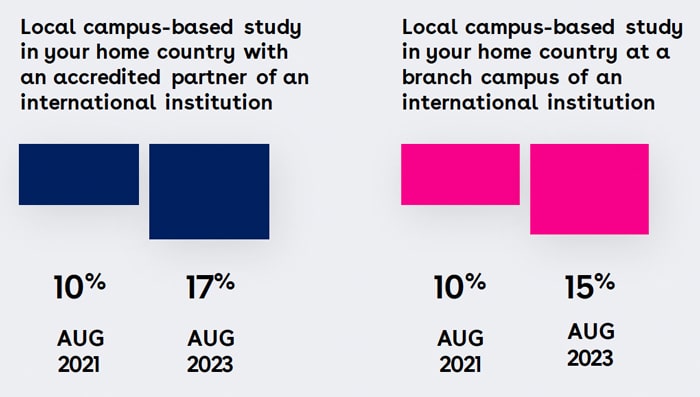Survey finds students more open to branch campus study
- There has been a 10% decline in the number of students who prefer to study in-person at an overseas campus
- But the proportion of students indicating they would prefer to earn an international qualification at accredited partner or branch campus in their home countries has increased by 12%
IDP's Emerging Futures 4 survey gathered responses from more than 10,000 students between 19 July and 21 August 2023. One of the findings that jumps out in this year's survey is that fewer students are planning to study in-person at an overseas campus.
Compared to the 81% who said that that was their preferred mode of study in August 2021, only 71% said they preferred in-person study at an overseas campus in the August 2023 survey.
The percentage of students who said they wanted to begin their studies online in their home country, and then complete them at an overseas campus, was virtually the same between the 2021 (18%) and 2023 (17%) surveys. And the same was true for those who said they preferred to study entirely online (10% in 2021 and 11% in 2023).
The 2023 survey cycle, however, found a marked difference in the percentage of students who said they wanted to pursue their studies at a local campus in their home country that was either a branch campus or accredited partner of an overseas institution. Only 10% said that this was their preferred mode of study in 2021 but that rose to 17% in August 2023 for accredited partner study and 15% for branch campus study.

The survey results make it clear as well that students still aspire to work abroad or migrate after completing an international qualification in their home country. When asked what were the most important aspects of earning an international qualification at home, students ranked the following factors from highest to lowest priority.
- Paying lower tuition fees compared to overseas study
- Ability to use the international qualification as a means to migrate after graduation
- Access to post-study work rights after graduation
- Access to a designated study hub/local learning centre
- Ability to study with a higher-ranked institution than would be possible through overseas study
The key takeaway for policy makers, IDP concludes, is that, "Students considering or enrolled at branches of international institutions still want some perks like post-study work rights or immigration pathways."
The 10% decline in students considering in-person overseas study (since the August 2021 survey) appear to be tied to another important finding from Emerging Futures 4: more than half (56%) of the student-respondents said that the recent increases in cost of living overseas have made them reassess their plans to study abroad.
The survey results suggest that the answer to those cost of living concerns, for some students at least, is that they are more open to studying at a partner or branch campus in their home countries.
For additional background, please see:
















